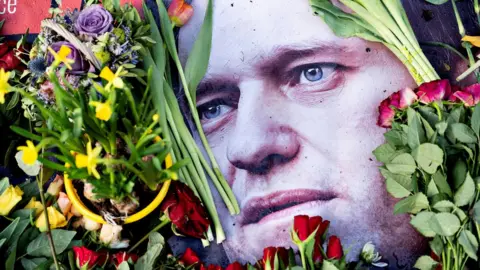Body of Alexei Navalny to be held for two weeks for 'chemical analysis', family told
 Reuters
ReutersThe family of Alexei Navalny, the Putin critic who died in a Russian prison, have reportedly been told his body will not be released for two weeks.
His mother was informed it was being held for "chemical analysis", a representative for Navalny said.
There has been no confirmation of the whereabouts of the body from Russian authorities, while efforts to locate it have been repeatedly shut down.
His wife, Yulia Navalnaya, has demanded the return of his body.
"Give back Alexei's body and let him be buried with dignity," she said in a post on X.
In a video on Monday vowing to continue his work to fight for a "free Russia", Ms Navalnaya directly accused Russian President Vladimir Putin of killing her husband.
Her voice sometimes shaking with grief and anger, she asked viewers to stand alongside her and "share the fury and hate for those who dared to kill our future".
She also alleged her husband's body was being kept until traces of poisoning by the nerve agent Novichok had disappeared. Navalny survived an attempt to kill him using the poison in 2020.
On Tuesday, Putin's spokesperson Dmitry Peskov called the accusations "unfounded and vulgar", but added that since Ms Navalnaya was widowed just days ago he wouldn't comment further.
Navalny's death in prison was announced on Friday. The authorities at the Siberian penal colony where he was being held said he had never regained consciousness after he collapsed following a walk.
His mother and lawyer travelled to the remote colony as soon as news of his death broke.
Attempts to locate the body have repeatedly been shut down by the prison mortuary and local authorities.
On Monday, the Kremlin said an investigation into Navalny's death was ongoing and that there were "no results" as of yet.
Later, Navalny's spokeswoman Kira Yarmysh said that investigators had told Navalny's mother Lyudmila they would not hand over the body for two weeks while they conducted a "chemical analysis".
 EPA
EPAIn her video message, filmed in a style recognisably similar to those her late husband used to make, Ms Navalnaya said she believed Navalny had been poisoned.
"They are hiding his body - not showing or giving it to his mother - and they lie. Waiting for the traces of Putin's latest Novichok to disappear," she said.
Navalny, who was the Russian opposition's most significant leader for the last decade, had been serving a 19-year sentence on charges many viewed as politically motivated.
Western leaders have put the blame for Navalny's death squarely on President Putin.
Responding to questions from reporters on Monday, President Joe Biden said: "The fact of the matter is: Putin is responsible, whether he ordered it or he is responsible for the circumstances he put that man in."
During a press conference on Monday, EU foreign policy chief Josep Borrell said he Navalny had been "slowly murdered in a Russian jail by Putin's regime".
Both the EU and the US have said they are considering new sanctions on Russia following Navalny's death.
The UK Foreign Secretary, Lord Cameron, has also said he expects Britain and the rest of the G7 group of rich nations to impose fresh sanctions on any Russians involved in the death.
Kremlin spokesman Dmitry Peskov said comments by Western politicians in regards to Navalny's death were "arrogant" and "unacceptable".
Russian prison authorities said at the weekend that Navalny had suffered "sudden death syndrome".
